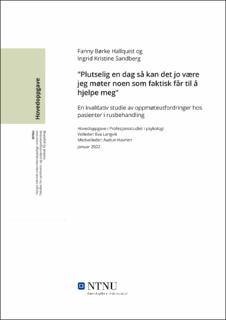| dc.contributor.advisor | Langvik, Eva | |
| dc.contributor.advisor | Havnen, Audun | |
| dc.contributor.author | Hallquist, Fanny Børke | |
| dc.contributor.author | Sandberg, Ingrid Kristine | |
| dc.date.accessioned | 2022-06-01T17:19:26Z | |
| dc.date.issued | 2022 | |
| dc.identifier | no.ntnu:inspera:92483746:23014392 | |
| dc.identifier.uri | https://hdl.handle.net/11250/2997275 | |
| dc.description.abstract | Bakgrunn: Uteblivelse fra behandlingstimer er et betydelig problem i rusbehandling, og påvirker behandlingsutfallet negativt. Vi har undersøkt hvordan pasienter i rusbehandling som har uteblitt fra timer opplever det å møte og å utebli fra terapitimer.
Metode: Vi har intervjuet syv pasienter mellom 18 og 30 år, rekruttert fra Psykiatrisk ungdomsteam (PUT) ved Nidaros DPS. Vi brukte en kvalitativ tilnærming med semistrukturerte intervju. Data fra intervjuene ble analysert med refleksiv tematisk analyse.
Resultat: Fire overordnede temaer ble identifisert, «Møter på tross av motstand og motløshet», «Små marginer og en krevende balanse for oppmøte», «Møter for endring» og «Må møte et menneske og bli møtt som et menneske», med to tema tilhørende hvert overordnet tema. Dette var viktige aspekt når deltakerne vurderte om de skulle møte opp til time. «Møter på tross av motstand og motløshet» handlet om at mange deltakere hadde negative erfaringer med helsevesenet før PUT, og at de opplevde behandlingen som emosjonelt belastende. «Små marginer og en krevende balanse for oppmøte» handlet om at oppturer, nedturer og praktiske hindringer kunne føre til uteblivelse fra timer, og at det skulle lite til før det å møte opp krevde mer av pasientene enn det ga dem. «Møter for endring» handlet om at pasientene vektla egenmotivasjon for behandlingen høyt og at denne motivasjonen var å kunne leve et vanlig liv. «Må møte et menneske og bli møtt som et menneske» handlet om møtet med en behandler de kunne stole på og betydningen dette hadde for oppmøte.
Konklusjon: Resultatene viser at behandlerne bør være oppmerksomme på belastningen pasientene opplever at behandlingen medfører. De bør også høre på pasientens ønsker for behandlingen, både praktisk og innholdsmessig, for å øke opplevd utbytte av behandlingen . I tillegg vil det være nyttig å høre på pasienters tilbakemelding underveis i behandlingen, spesielt etter uteblivelse fra time. Dette kan lette noe av byrden av behandlingen for pasienten og kunne øke oppmøte. | |
| dc.description.abstract | Background: Absence from appointments is a significant problem in substance abuse treatment, and has a negative effect on the outcome of treatment. We have studied how patients in substance abuse treatment who have been absent from appointments experience attending and abstaining from appointments.
Method: We performed interviews with seven patients between the ages of 18 and 30, recruited from Psykiatrisk ungdomsteam (The Psychiatric Youth Team, PUT) at Nidaros DPS. We used a qualitative approach with semi-structured interviews. Data from the interviews were analyzed using reflective thematic analysis.
Results: Four overarching themes were identified, "Attending despite resistance and discouragement", "Small margins and a challenging demanding balance for attending", "Attending for change" and "Must meet a person and be met as a person", with two themes belonging to each overarching theme. These aspects were important when the participants considered whether to attend the appointment. The theme "Attending despite resistance and discouragement" outlined many participants´ negative experiences with the health care system before PUT, and the emotional stress following their treatment. "Small margins and a challenging balance for attending" considers both ups and downs as well as practical obstacles as leading causes of no-show, and how those disadvantages quickly seemed to outweigh positive impact of treatment. "Attending for change" was about the patients strongly emphasizing self-motivation for attending the treatment, where the promise of leading a normal life acted as a powerful motivation. "Must meet a person and be met as a person" emphasizes the importance of encountering a therapist the patients found to be trustworthy, consecutively showing the significance this trust had for choosing whether to attend.
Conclusion: The results indicate that therapists need to be more aware of the burden the treatment experienced by the patients entails. They should also consider the patient's wishes regarding the treatment, both practically and in terms of content, in order to increase the perceived benefit of the treatment. Additionally, listening to patients' feedback during treatment provides useful insight, especially after no-show; this might ease some of the burden of treatment for the patient and could potentially increase attendance. | |
| dc.language | nob | |
| dc.publisher | NTNU | |
| dc.title | "Plutselig en dag så kan det jo være jeg møter noen som faktisk får til å hjelpe meg" - En kvalitativ studie av oppmøteutfordringer hos pasienter i rusbehandling | |
| dc.type | Master thesis | |
